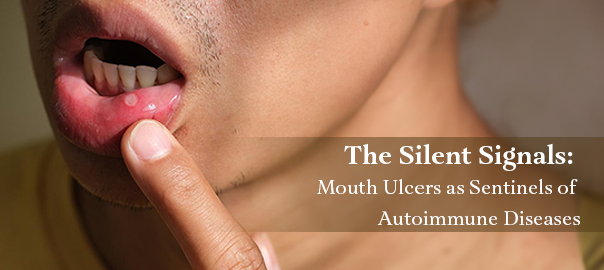
The Silent Signals: Mouth Ulcers as Sentinels of Autoimmune Diseases
Mouth Ulcers and Autoimmune Diseases
Oral health often serves as a mirror to our overall well-being. Of all the symptoms our mouths can display, mouth ulcers are particularly noteworthy as possible markers of underlying autoimmune diseases. This blog explores the relationship between few autoimmune disorders and mouth ulcers.
The Autoimmune Link
Autoimmune diseases occur when the body’s immune system accidentally attacks its own tissues. Many of these conditions manifest early signs in the oral cavity. This makes dentists crucial in their initial detection.
Here are some key autoimmune diseases associated with oral ulcers:
1. Systemic Lupus Erythematosus (SLE)
SLE can present oral discoid lesions, often among its first visible signs. These lesions appear as:
• Round or irregular red areas
• Sometimes with white radiating striae
• Possible ulceration or atrophy
Other oral manifestations may include:
• Petechiae (small red or purple spots)
• Gingival bleeding
• Desquamative gingivitis
2. Sjögren’s Syndrome
This condition primarily affects salivary and lacrimal glands, leading to:
• Dry mouth (xerostomia)
• Increased risk of oral infections, especially candidiasis
• Higher susceptibility to dental caries
• Difficulty in speaking and swallowing
3. Pemphigus Vulgaris
Often starting in the oral cavity, pemphigus vulgaris presents as:
• Painful erosions or blisters
• Lesions that can affect any oral mucosal surface
• Positive Nikolsky sign (epithelial detachment upon slight pressure)
4. Mucous Membrane Pemphigoid
Primarily affecting the gingiva, this condition causes:
• Desquamative gingivitis
• Blisters or ulcers on oral mucosa
• Lesions that may persist longer than in pemphigus vulgaris
5. Behçet’s Syndrome
Characterized by recurrent oral ulcers, often accompanied by:
• Genital ulcers
• Ocular inflammation
• Skin lesions
Diagnosis and Management
Identifying these conditions requires a multifaceted approach:
• Thorough clinical examination
• Detailed patient history
• Biopsy for histological examination
• Immunofluorescence studies
• Blood tests for specific antibodies
Treatment strategies vary depending on the specific condition but often include:
• Topical or systemic corticosteroids
• Immunosuppressive medications
• Saliva substitutes for dry mouth
• Meticulous oral hygiene
The Dentist’s Role
Dental professionals play a pivotal role in:
• Early detection of autoimmune-related oral lesions
• Referral to appropriate specialists
• Collaborating in multidisciplinary treatment approaches
• Providing supportive care for oral manifestations
Although common, mouth ulcers can occasionally be the initial indication of severe autoimmune disorders. Frequent dental examinations are important for maintaining oral health as well as possibly for identifying systemic problems early on. In order to rule out underlying autoimmune disorders, patients with mouth ulcers that are persistent or recurrent should be evaluated by a physician. By means of attentive observation and interdisciplinary cooperation, dental practitioners provide a substantial contribution to the prompt diagnosis and treatment of these intricate autoimmune disorders.
Leave a Reply
Leave a Reply
Explore More Similar Posts
Explore More Blogs


Leave a Reply